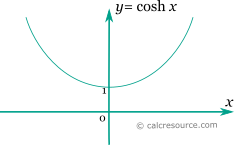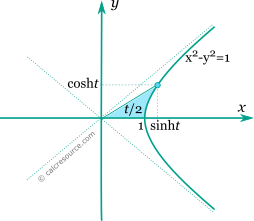ADVERTISEMENT
Definitions
General
The hyperbolic cosine function is defined as:
The graph of the hyperbolic cosine function is shown in the figure below. It is a monotonic function, unlike the trigonometric cosine, which is periodic.

The points form the right wing of an equilateral hyperbola (see figure below), just like the trigonometric cosine, sine pairs form a circle.
The points form the right wing of an equilateral hyperbola (see figure below), just like the trigonometric cosine, sine pairs form a circle. Parameter t is the half area between the hyperbola, the x-axis and a ray from origin to the point.

Series
All hyperbolic functions can be defined in an infinite series form. Hyperbolic cosine function can be written as:
Properties
The derivative of the hyperbolic cosine function is the hyperbolic sine:
The integral of the hyperbolic cosine is given by:
